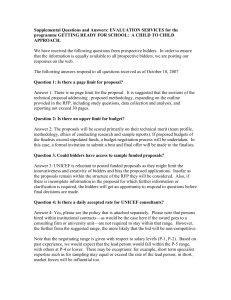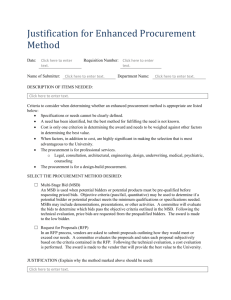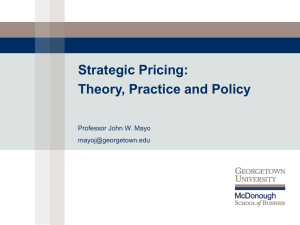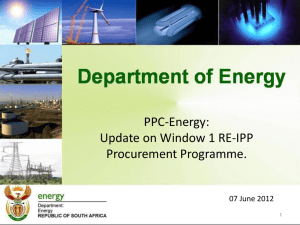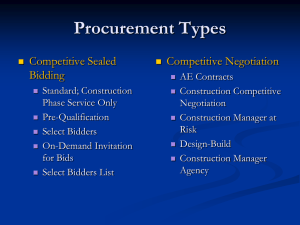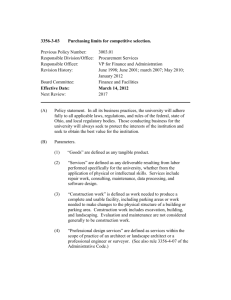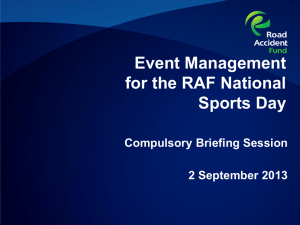The Integrity Pact - International Anti
advertisement
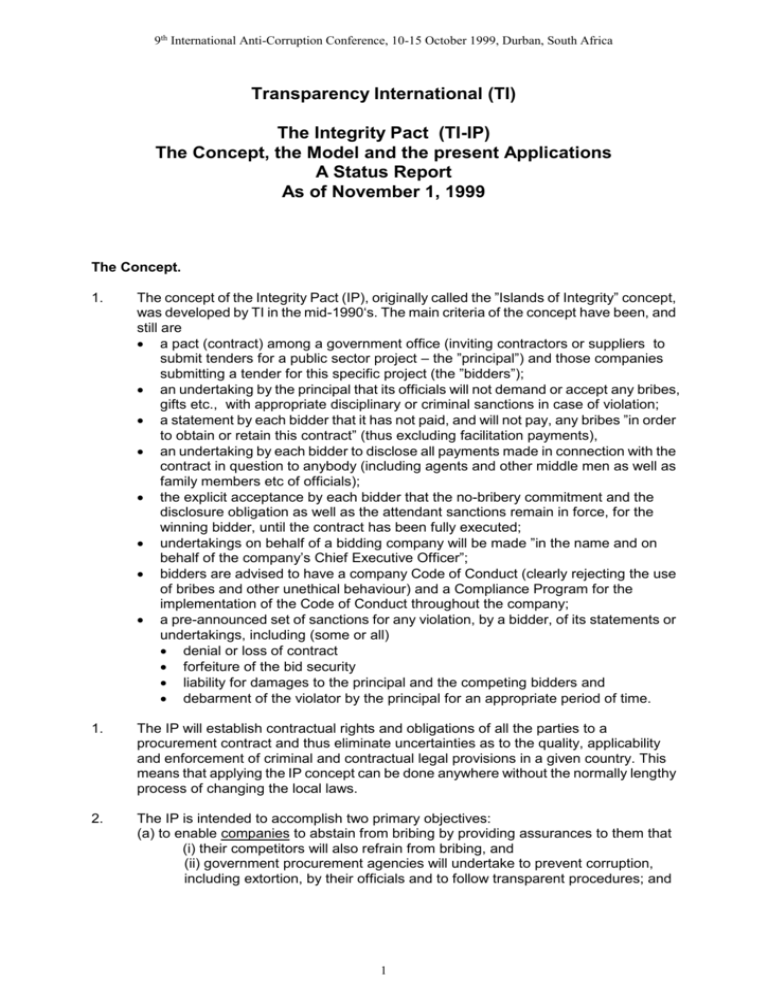
9th International Anti-Corruption Conference, 10-15 October 1999, Durban, South Africa Transparency International (TI) The Integrity Pact (TI-IP) The Concept, the Model and the present Applications A Status Report As of November 1, 1999 The Concept. 1. The concept of the Integrity Pact (IP), originally called the ”Islands of Integrity” concept, was developed by TI in the mid-1990‘s. The main criteria of the concept have been, and still are a pact (contract) among a government office (inviting contractors or suppliers to submit tenders for a public sector project – the ”principal”) and those companies submitting a tender for this specific project (the ”bidders”); an undertaking by the principal that its officials will not demand or accept any bribes, gifts etc., with appropriate disciplinary or criminal sanctions in case of violation; a statement by each bidder that it has not paid, and will not pay, any bribes ”in order to obtain or retain this contract” (thus excluding facilitation payments), an undertaking by each bidder to disclose all payments made in connection with the contract in question to anybody (including agents and other middle men as well as family members etc of officials); the explicit acceptance by each bidder that the no-bribery commitment and the disclosure obligation as well as the attendant sanctions remain in force, for the winning bidder, until the contract has been fully executed; undertakings on behalf of a bidding company will be made ”in the name and on behalf of the company’s Chief Executive Officer”; bidders are advised to have a company Code of Conduct (clearly rejecting the use of bribes and other unethical behaviour) and a Compliance Program for the implementation of the Code of Conduct throughout the company; a pre-announced set of sanctions for any violation, by a bidder, of its statements or undertakings, including (some or all) denial or loss of contract forfeiture of the bid security liability for damages to the principal and the competing bidders and debarment of the violator by the principal for an appropriate period of time. 1. The IP will establish contractual rights and obligations of all the parties to a procurement contract and thus eliminate uncertainties as to the quality, applicability and enforcement of criminal and contractual legal provisions in a given country. This means that applying the IP concept can be done anywhere without the normally lengthy process of changing the local laws. 2. The IP is intended to accomplish two primary objectives: (a) to enable companies to abstain from bribing by providing assurances to them that (i) their competitors will also refrain from bribing, and (ii) government procurement agencies will undertake to prevent corruption, including extortion, by their officials and to follow transparent procedures; and 1 9th International Anti-Corruption Conference, 10-15 October 1999, Durban, South Africa (b) to enable governments to reduce the high cost and the distortionary impact of corruption on public procurement. 3. Beyond the individual contract in question, the IP is of course also intended to create confidence and trust in the public decision making process in general, a more hospitable investment climate and public support – in-country – for the government’s procurement, licensing and privatisation programs. 4. From the outset it has been expected that Civil Society in the respective country would play a key role in overseeing and monitoring the correct and full implementation of the IP. Two arguments often raised against such a monitoring role for Civil Society can easily be disarmed: Availability of the necessary expertise among the Civil Society monitors, where it does not exist among the regular members, can be assured by contracting genuine experts; and the legitimate confidentiality of proprietary information, to which Civil Society representatives would gain access, can be protected adequately through an appropriate contractual stipulation. 1. There has been no change in these main criteria and objectives. There have only been some broadening of, and refinements to, the concept, as explained below. The Model. 2. The latest (and current) model of the IP has been developed for Indonesia, in the summer of 1999. It incorporates a number of changes which were made after discussions with various interested parties, including governments, companies, International Financial Institutions (IFIs) including the World Bank and the Asian Development Bank, the Court of Arbitration of the International Chamber of Commerce, lawyers and – last not least – members of TI-S and several TI National Chapters. 3. A copy of the (neutralised) latest Model is attached (as Annex A). It consists of an Explanatory Note, a (draft) Government Communication to Bidders, and (draft) Procedures for Bidding. 4. The ”broadening” refers to the suggestion, contained in the ”Explanatory Note” to the Model, that the IP concept is suitable not just for construction and supply contracts, but equally for the selection 1. of (engineering, architectural or other) consultants, of the buyer/recipient of state property as part of a government’s state asset privatisation program, or of the beneficiary of a state license or concession for oil or gas exploration or production, mining, fishing, logging or other extraction rights, or for government-regulated services such as telecommunications, water supply or garbage collection services. The ”refinement” refers to many changes in the original concept document which are too numerous to list; only a few merit mentioning here: The ”liability for damages” has been modified so as to provide for ”liquidated damages”, i.e. a pre-determined level of damages (a certain percentage of the contract value) which will apply unless the principal can demonstrate that the actual 2 9th International Anti-Corruption Conference, 10-15 October 1999, Durban, South Africa damage is higher, or the bidder responsible for damages can demonstrate that the actual damage is lower. The venue for collecting damages will be ”international arbitration under the rules of the International Chamber of Commerce”. Relying on the jurisdiction of a Northern country is likely to be unacceptable to principals in a Southern country; equally, relying on the national jurisdiction of a Southern country is likely to give little comfort to bidders from Northern countries; thus the consensual choice of arbitration by the ICC Arbitration Court, with place of session, applicable law and number of arbitrators to be agreed between the parties, will give adequate comfort to all participants of the agreement. Considering that ”agents” and ”middlemen” often are used primarily as instruments for paying bribes, the Model contains a stipulation that payments to agents must not exceed ”appropriate amounts for legitimate services”. This language stems from the ICC Rules of Conduct (”Extortion and Bribery in International Business Transactions”, 1996 Revision). In fact, many globally active companies have begun to refrain from using such agents or middlemen. ”Officials” of the principal will be required to disclose their own and their family assets, on a regular basis, so as to offer a handle if such officials acquire wealth the source of which cannot be explained. Consultants commit themselves not only not to pay bribes in order to obtain a contract, but also to design the project or project components in a manner that is totally non-discriminatory, assures wide competition and will not offer advantages to a specific bidder. 1. One question very often asked is ”what kind of evidence is required to be certain of a violation by a bidder” so as to trigger sanctions? Suspicion alone cannot be enough. Clearly, a criminal conviction for bribery is the most persuasive evidence, but then a criminal conviction is rarely obtained, and in the few cases it usually comes much too late to be of any help in administering prompt sanctions. German practice is to treat a no-contest statement or an admission of guilt as equally persuasive, and recently the practice is emerging of considering it as adequate evidence of a violation if ”on the basis of the facts available there are no material doubts”. 2. In judging the suitability of the IP Model one should take into account that since February 15, 1999, the OECD Convention makes bribing a foreign official a criminal act in all states that have ratified the Convention (at this writing, 16 out of 34 signatory states, but all the other signatories are likely to follow soon), and in many of those countries the tax deductibility of bribes, which had been allowed previously, has been abolished. Bidders from many countries thus face a fundamentally different legal situation from the one they had operated under for years, and they should be prepared to enter into agreements designed to provide a ”level playing field” for all competitors irrespective of whether they come from countries bound by the OECD Convention rules or not. 3. We are rarely using the ”islands of integrity” term any longer – despite its obvious public appeal - since it suggests that this ”island” is surrounded by a morass of corruption; several governments have objected to the term on these grounds. Indeed, we believe that using an IP for a single major investment project will overall be more effective if the government concurrently is introducing a country-wide anti-corruption or general governance program. TI may offer assistance in designing such a program, but its existence is not a prerequisite for using an IP. 4. While a clear and unrestricted oversight and monitoring role for Civil Society in any country is highly desirable, it is understood that in some countries the government will 3 9th International Anti-Corruption Conference, 10-15 October 1999, Durban, South Africa not, at this time, be prepared to allow Civil Society such a role. In those cases the oversight and monitoring function could be performed in one of several ways: 5. 6. The government employs what in some US cases has been called an ”Independent Private Sector Inspector General” (or IPSIG); the IPSIG, a private sector company or group of individuals, would of course come with the necessary expertise; such an arrangement can be acceptable provided the IPSIG is given not only full access but also has the contractual right to seek correction of any procedural problems or improprieties and, if no correction takes place, to inform the public of the impropriety. Or: The government commits itself to provide full public disclosure of all relevant data regarding the evaluation of the competing bids. This would include a statement, that the evaluation criteria announced in the invitation to tender were fully applied, a list of the bidders and their prices, a list of the bids rejected, including the grounds for rejection, the major elements and aspects of the evaluation process and the specific reasons for selecting the winning bidder. The government should also at this time announce its own cost estimate for the project. 7. It is worth underlining again the importance of having the IP commitments apply from the very first stages of project design until the completion of implementation (indeed, for projects such as big dams or toxic plants such as nuclear power plants, until the decommissioning and disposal of project assets). Even the preparation of the earliest alternative choice and design documents should be covered – if not, a dishonest consultant can mis-direct the entire preparation process for the benefit of some contractors or suppliers. 8. One should also remember that signing of the IP cannot be voluntary on the consultants or bidders. Bidders will be prepared to sign the IP provided all the other competitors also sign. If only one bidder refuses to sign, all the others will withdraw their commitment, since after all the objective is the creation of a level playing field – for all players. That’s why the IP Model contains a clause that says that any bid which does not contain the prescribed commitments will not be considered. 9. A fascinating and possibly relevant recent development is the use in several countries of the Internet for total transparency of procurement. In Mexico, all public procurement activities countrywide are recorded and made available in great detail through a website that is accessible to all. In Colombia, a State Contracting Information System (SICE) is also widely accessible. Similar electronic information systems are being applied in Chile and South Korea. A similar system will go on-line in Austria before the end of 1999. The high degree of transparency achieved through this real-time access to public decision making clearly reduces the opportunity for manipulation and should enhance the willingness of officials and bidders alike to commit to a corruption-free contracting procedure, such as through the IP. 10. Finally, experience shows that the political will to reduce corruption and to revive honesty and integrity in procurement is a sine-qua-non for success. That’s why we recommend starting any IP process by establishing the existence of that political will – at the highest political level. The Applications. 11. There is at this moment no case where the full ”model” as described above has been, or is being, applied. However, there is an increasing number of cases where the principles of the IP are being applied, usually on a selective basis. While TI would 4 9th International Anti-Corruption Conference, 10-15 October 1999, Durban, South Africa welcome the full application of the model, it greatly appreciates the many efforts by TI-members world-wide to introduce the IP concept as fully as possible and encourages further experimentation with modified applications rather than insisting on a ”purist” approach. 12. It will obviously be much easier to achieve consensus among all the parties involved if the proposal is (i) fully accepted and supported by the host government and (ii) put before the commercial parties in cases when there are no major existing vested interests (like a longstanding record of the same companies winning time after time), and in any case (iii) put before the companies at the very beginning of preparing an investment project, before the traditional (project-specific) inroads have been made by the traditional or new actors in the country. 13. However, in order to assure consistency of our efforts, National Chapters are requested to maintain close contact with TI-S (and Michael Wiehen at mwiehen@ti-deutschland.de ) while they discuss and develop ”customised” versions of the IP. TI will make every effort to develop a group of Resource Persons who can provide the necessary expertise in response to calls for help from individual National Chapters. 14. We will also soon put this Status Report with all its Annexes on the TI Website so as to allow access for all interested persons (TI Members and others) to a full story of the IP and its applications and experiences. 15. Past applications of the IP took place in Ecuador (1993), in Panama (1996/97) and in Mendoza Province, Argentina (1997/98). 16. In Ecuador (see Annex B), Vice President Dahik in June 1993 announced the intention of the government to rid all government procurement of bribes and other corruptive acts and declared that henceforth all major projects (listed in a government document) would be subject to a ”corporate commitment” to support the government’s anti-corruption campaign, to refrain from offering or giving bribes, to disclose all payments to agents or others in connection with the contract, and to instruct all its employees to abide by this commitment. 17. This ”corporate commitment” was submitted by all bidders for the $160 million Refinery Rehabilitation Project. The selection process went forward without a hitch, and without any suspicion of bribes having been paid, and at a lower price than had been anticipated. Unfortunately, before it could be utilised for a second project ( a $600 million Oil Pipeline Project) political developments in the country led to a government change and the program was dropped. 18. In Panama (see Annexes C and C1), the government in 1996 invited the TI-National Chapter, in its capacity as a member of Civil Society, to provide oversight function for the privatisation of 49% of the shares of the Panamanian telephone company. Even though this invitation arrived after the crucial phases of design, preparation of specifications and pre-qualification of bidders, and it thus was too late for introduction of the IP concept, TI-Panama accepted it on condition that it would have access to all relevant documentation, that it would be invited to all INTEL Board of Directors meetings, and that it could publish weekly reports on its activities through the press. These conditions were acceptable to the government. TI-Panama brought in an international telecommunications expert who offered specific recommendations for changing the bidding documents, which the government accepted. The result: All stakeholders agree that the privatisation was accomplished in a fair and transparent 5 9th International Anti-Corruption Conference, 10-15 October 1999, Durban, South Africa environment. No claims of corruption were made, and even the losing company stated its contentment with the process. The sale brought in an amount 30% higher than the original estimate. 19. TI-Panama was also called in by government to act as observers in the privatisation of the electric company. When TI-Panama replied that, rather than as observers, they would like to come in and apply the IP concept, IFC – which acted as advisor to government – objected on the ground, that use of the IP would probably scare away potential bidders. The government did not press IFC. 20. Since 1998 the IP has been considered in two cases: the public selection of the companies that will invest and manage the social security money of civil servants, and the assignment of radio and TV frequencies. TI-Panama insisted on the utilisation of the full IP, and on that ground the efforts came to a stop. 1. In Mendoza Province, Argentina, the Provincial Governor decided in 1997 to amend the procurement rules, initially for all purchases by the Information Services Department, to include an Integrity Agreement between the Government of the Province and companies interested in bidding for government contracts. Under this agreement, the government commits itself to provide for full transparency in its relationship with suppliers to assure that all its employees will act by criteria of impartiality to assure that employees will not accept or demand any bribes to train and guide employees toward this end to introduce a Company Undertaking to be submitted by all those wishing to compete for Government business which requires promises -not to offer or pay any bribes to government officials -to inform the State Prosecutor of any violations -to disclose to the State Prosecutor all payments made by the company in connection with this contract -to inform the State Prosecutor of all its internal corruption prevention procedures like Codes of Conduct, ethics audits, control systems etc. to introduce a requirement for bidders to deposit a bid bond in the amount of US$ 20,000 which will be forfeited in case a violation occurs to exclude violators from future contracts, directly or indirectly, with the Province of Mendoza, for a period of 5 years to appoint the State Prosecutor as official in charge of overseeing the implementation of this policy. 1. The present status and experience in Mendoza Province are not fully known, but it appears that the I.P. process is not being practised at the present time. 2. The Heads of State or Government of seven African countries (Benin, Ethiopia, Malawi, Mali, Mozambique, Tanzania and Uganda) in 1998 wrote to the World Bank and requested that future Bank procurement be subject to the IP. The Bank decided that the IP had a chance to succeed only if a number of minimum conditions regarding governance in the country were fulfilled. Unfortunately the IP has not yet been introduced into any Bank-financed activities in those countries. 3. The IP Concept has also been presented to the Prime Minister of Ethiopia, the Governor of Sindh Province, Pakistan, and the City Administration of St. Petersburg, Russia, but to date there has been no follow-up by the respective government. 6 9th International Anti-Corruption Conference, 10-15 October 1999, Durban, South Africa 4. In St. Petersburg, we came across a (draft) unilateral ”Declaration of Integrity in Business Conduct” (committing to transparency, sanctity of contracts, fair competition, repudiation of corrupt practices and legal settlement of disputes), which is submitted by companies to be listed in a Public Register (in the expectation that eventually only companies listed in this Register will be allowed to submit tenders for government business). 5. In the Spring of 1999 we became aware of the fact that the World Commission on Dams was beginning a thorough reassessment of the procedures for reviewing proposals for large dams (anywhere in the world), including institutional and governance issues. We offered immediately to contribute to this process on a broad scale, and in particular, to help them develop procurement rules applying the IP concept. This work is now underway. We have submitted a comprehensive set of proposals for strengthening procurement in general and have also suggested applying the IP principles and concept. 6. When the publicly-owned corporation in charge of building a world-class international airport outside Berlin/Germany, the three owners – the States of Berlin and Brandenburg and the Federal Republic - announced in 1996 that they would seek competitive offers for the construction/privatisation, TI suggested that the IP concept be applied and offered its assistance and co-operation. While several of the competitors indicated interest in the concept, the public-sector corporation indicated ”no need” for this complication, and TI dropped the proposal. Several accusations of corruption and of conflicts of interest have surfaced since then, and very recently the Supreme Court of the State of Brandenburg annulled the award of the contract to one of the competitors, on the ground of ”irregularities”, primarily personnel-linkages between various parties to the deal. It is not clear whether actual corruption is involved, and whether applying the IP could/would have made any difference. Nevertheless, this would have been a perfect case for applying the IP. But the public-sector owners – represented by members of the respective governments were apparently not interested in the additional transparency; now they have to live with a web of suspicions and accusations. As we go to press with this status report, suspicions about several of the bidders remain. At issue is also the true independence of one of the consultants – a problem that is emerging in several other corruption cases around the globe, suggesting that we are on the right track in demanding disclosures and commitments from the consultants as well as from the contractors. 7. At this moment the IP concept is being considered or applied in some form in the following places: Argentina – Buenos Aires – Construction of Linea H Subway Colombia – Telecommunications Services, Electricity Distribution, Construction of Bridges and Highways, and Urban Development Benin – a General Code of Ethics and application of the IP to a highway project financed by the Kreditanstalt für Wiederaufbau, Germany Papua New Guinea – Privatisation of State Assets Indonesia – various investment projects under the Technology Ministry, with financing by the Asian Development Bank; Nigeria – several projects Nepal – the City of Bhaktapur. The status of each effort will be described in summary in this note (to the extent we have that information), and in some detail in an Annex. 7 9th International Anti-Corruption Conference, 10-15 October 1999, Durban, South Africa The model has also been proposed to the International Olympic Committee for the selection of sites for holding the Games. 1. In Buenos Aires, Argentina, a limited Integrity Pact is being negotiated for the selection of contractors to build a new subway line – ”Linea H” – in Buenos Aires. The total cost of this investment project is estimated at about US$ 1.200 million. One handicap of this case is that the IP proposals of Poder Ciudadano (the TI-NC) were made after a number of companies or consortia of companies had been pre-qualified, making it difficult to impose new restrictive rules on the selection process. The Government of the City of Buenos Aires (the CityGovernment) had in fact at first argued that the IP needed to be based on a changed law but finally agreed to use the IP on Linea H as a pilot case, assuming voluntary consent by the bidders. It is quite remarkable what Poder Ciudadano has actually achieved. Details are shown in Annex E. 2. The CityGovernment has suggested to the pre-qualified bidders that they sign – voluntarily – a pledge of integrity with the following major elements: scrupulous compliance with the legal and ethical principles which the government’s procurement rules are designed to protect, in particular free competition and equality the government and the companies are fully responsible for all actions of their employees in case of a violation, strict sanctions will be applied blacklisting of violators for an appropriate period of time openness and transparency of the bidding process right of complaint for all bidders and citizens alike access of the bidders to certain (???) documents of the bidding process right of CityGovernment or bidders to submit any aspect of the process to audit by an independent expert to be selected by TI, and Government commitment to abide by the ruling. 1. Poder Cuidadano succeeded in arranging a unique series of Public Hearings, at which all important aspects of the project were aired and could be questioned by the public at large, and specific recommendations for changes could be made. This process clearly led to a maximum of transparency of the process. Poder Ciudadano prepared itself for its role at the Hearings and afterwards by training about 35 volunteers consisting of professors, students, business experts and retired persons.. Poder Ciudadano also held several meetings with representatives of the bidders/consortia.at which it discussed the requirements and the advantages of transparency and of the IP. All the companies apparently agreed to sign the IP. The experience with the Hearings is described in Annex E 1. 2. Poder Ciudadano was also called in by the Municipality of Avellaneda ( Province) to monitor a public hearing to discuss the feasibility of the construction of a bridge financed by the World Bank. The City of Avellaneda did not have any experience with public hearings, and thus Poder Ciudadano in less than one month trained the staff of the City and then supervised the preparation and execution of the public hearing. 3. Poder Ciudadano usually brings in national and international experts to offer expert advice on specific aspects of the project process, including on technical aspects of the project. 4. In Colombia, the incoming government of President Pastrana was so much affected by Colombia’s poor position on TI’s Corruption Perception Index that it included the 8 9th International Anti-Corruption Conference, 10-15 October 1999, Durban, South Africa fight against corruption among the priorities of the National Development Plan of May 1999. In Art 4 Chapter 2 it reads: ”In order to bring Civil Society into the fight against corruption, the application of the TI-Integrity Islands world program shall be promoted so that bidders in international and national public procurement commit to personal and economic responsibilities through anti-corruption agreements...” The Government of Colombia sees this as a means for generating trust and credibility among public servants, bidders and the public at large and thus to give rise to a voluntary cultural change by bringing everybody’s behaviour closer to ethical principles and the legal framework of Colombia. 5. The TI-NC (TICOL) has been singularly effective in persuading the Vice-Presidency of the Republic, other senior officials and many other public figures of the benefits and advantages of a high degree of transparency in public procurement, of matching Integrity Pacts (unilateral commitments by officials as well as by the bidders) and of a strong monitoring role for Civil Society. TICOL has achieved the application of this procedure to (i) the selection of operators for ”community telecommunication points” (value US$ 80 million), and is negotiating its application to (ii) the privatisation of 14 regional electricity distribution companies (value: US$ 1.400 million), (iii) the construction of a major highway (value US$ 1.040 million), and (iv) a major urban development project, including roads and bridges (value US$ 250 million). Several other procurement, concession and privatisation cases are under active consideration for application of the IP. 6. For the telecommunications project (see Annex F) about 18 senior officials, including the Vice-President of Colombia and the Minister of Communications, on August 18, 1999 signed a ”Pacto de Integridad” in which they commit inter alia to comply with all the relevant laws not to solicit or accept any bribes to report any offers of bribes to exercise control over.... and formally invited the bidders to sign an Integrity Pact as well. 1. For this same project, the bidders signed a ”Pacto de Integridad” according to which they made the following commitments: to comply strictly with all the relevant procurement laws of Colombia, in letter and spirit not to offer or grant any bribes, rewards or bonuses with the purpose of influencing the bid related decisions to notify the President’s Office immediately of any offer or demand for payments, favours, gifts etc that may be construed as having been made with the intention of inducing a decision to give special care in their tender offer to cover all actual costs and, for the successful bidder, to avoid requests for budget increases and rate adjustments to sign an ethical behaviour commitment with their joint venture partners, subcontractors and vendors that guarantee the honesty of the actions of all those involved in the execution of the contract to inform TI-COL of all payments made to third parties for two years as from the contract date and not to offer employment or consultancies to any of the public servants involved in the bidding process. The bidders also submit to debarment for five years if there is evidence of a violation of the commitment. 9 9th International Anti-Corruption Conference, 10-15 October 1999, Durban, South Africa 1. TI-COL was entrusted with the follow-up of the commitments and the dispute resolution, and was also asked to act as a spokesperson for the IP before national and international public opinion. 2. The bidders were advised of the requirement of a Pact before bid opening, and they worked out, among themselves, a text with which they all could live. The Integrity Pact was also signed as witness by the Executive Director of TICOL. 50. There is also a ”Declaration by the Colombian Citizens Responsible for the Design and Execution of the Compartel Program”, signed inter alia by the members of TI-COL, in which the highest standards of acting as monitors under the program are pledged. Details of the documents for the telecommunications project can be found in Annexes F, F 1 and F2 . 51. Similar documents are likely to be issued for the other projects listed above. TICOL has been deeply involved in developing this set of documents, but one of the reasons for its success may be that it has co-operated very closely with universities, professional organisations, think tanks and other members of Civil Society. TICOL will be fully and formally committed to the monitoring and supervision of the Pacts. TICOL is planning to achieve the widest public understanding and observation of the process by arranging a series of Public Hearings. TICOL is also planning to press for using the IP concept for consultant selection and for all major cases of concessions or privatisations. 52 In fact, the privatisation of ISAGEN, the largest power generation company of the country, is being readied for the IP approach at this time. The unilateral declarations to be signed both by the government officials and the members of the consultant firm, that is preparing the project, have been drafted, as well as the IP to be delivered to the bidders. 53. TICOL has also announced that it will extend its monitoring to the entire implementation period of projects, concessions etc – to make sure that initially ”correct” agreements are not subsequently adjusted and eroded once the limelight of Civil Society has shifted elsewhere. 54. Another interesting feature of this package is that the World Bank appears ready to help finance the Roads project. First indications are that the Bank will be ready to accept the Integrity Pact approach worked out by TICOL. 55. In Benin, the government on 22 June 1999 issued a ”Code d’Ethique et de Moralisation des Marches Publiques” ( a ”Code of Ethics” – see Annex G) which, in the form of a decree, will be incorporated into existing legislation on public sector procurement. This Code requires both government officials involved in the administration of public procurement and bidders to submit formal commitments to abstain from corrupt practices during the bidding process and the implementation of the contract (see Formulaire ”A” and ”B” of Annex G). This explicit renunciation of corrupt practices in public procurement will be compulsory for all cases of competitive tendering. The Code makes provision for appropriate sanctions in case of violation. The Code also provides for Civil Society ‘s monitoring role in the process, with the possibility to recruit qualified experts to independently evaluate the bidding process and the implementation of the contract. 56. TI-Bénin (with the support of several Resource Persons from TI-S) was actively involved in this initiative and played an important role in guiding the development 10 9th International Anti-Corruption Conference, 10-15 October 1999, Durban, South Africa process of the new code. The TI-IP clearly has provided much inspiration for the Code of Ethics. 57. We have recently been advised that the Kreditanstalt für Wiederaufbau (KfW), the German Government-arm for development assistance (and a corporate member of TI-D), is prepared to apply the IP Concept to the financing of a major bridge construction project ( value DM 47 million) in Cotonou. We are following up. 58. In Papua New Guinea, the TI National Chapter in early 1999 presented the IP Concept to the Government for adoption by the Privatisation Council (TPC), and Sir Anthony Siaguru was confident, that it was to be adopted. Since a recent change in government (effected constitutionally) the new PM has established by legislation a Privatisation Commission. Sir Anthony has again distributed the IP Concept to all the Commissioners and spoken with the minister responsible. The Minister has indicated an interest in talking to TI experts. We will follow up. 59. In Nigeria, TIN and the government in September 1999 held a three-day workshop bringing together the public and private sectors to discuss new ethical rules in the public-private sector interchange. As a part of this workshop several international resource people spent two full days assisting a group of senior Nigerian officials (including several at Permanent Secretary level) develop a very detailed set of technical recommendations on how to change procurement procedures in Nigeria. Among the recommendations is the following: ”TI-Integrity Pact should be introduced on a pilot basis to selected major investment projects, say 1 World Bank and one African Development Bank funded 2 Federal Government of Nigeria funded 2 sample state-funded contracts 1 licensing contract 1 privatisation process.” 60. The Report of this Public Sector Procurement Workshop was presented to President Obasanjo on September 16, who instructed his officials to submit it to the Council of Ministers. We can thus expect to have IP discussions in Nigeria in the near future as well. 61. Incidentally, the recommendations contained in the Report of the Workshop on the strengthening of procurement in general might be useful in other countries as well, especially since most of them can be implemented without changes in the law. For that reason, a copy of that Report is attached hereto as Annex H. 62. In Nepal, the municipality of Bhaktapur, a medieval town of 35.000 inhabitants, has signed an agreement with TI-NEPAL with the aim of making Bhaktapur an Island of Integrity by increasing transparency and accountability in all municipal contracts. The agreement includes elements of the IP concept which are merged with provisions like simplification of the decision-making processes, more comprehensive information on the town’s budget, complaint boxes, name tags for employees, billboards on construction sites informing about the project and the commitment of suppliers and the municipality not to pay or demand bribes. The Mayor of Bhaktapur is strongly supporting the project. A Monitoring Committee has been formed to follow-up and expedite the activities of the project. The Committee comprises 7 members including three each from the municipality and TI-NEPAL and a consultant for the project. The municipality is launching a program to inform the citizens about the Integrity Project and 11 9th International Anti-Corruption Conference, 10-15 October 1999, Durban, South Africa to make them aware of its objectives and activities. A Perception Survey collecting the peoples’ opinion on the municipality and the Integrity System is being conducted. A Role for Civil Society. 63. In several cases, especially in Buenos Aires, Colombia and Benin, Civil Society and especially our National Chapters there have played critical and highly effective roles in coaxing governments, officials, contractors, the private sector in general and the media into acceptance of the Integrity Pact approach. Two issues that have plagued them consistently were (i) access to expertise and (ii) funding, for their activities both during the preparatory phase and during the much more involved and staff-intensive implementation phase. As far as the expertise is concerned, our group of Resource Persons is slowly growing, but TI-S needs to accelerate and systematise the development and the broad accessibility of such expertise. Especially during implementation, NCs may have to call and rely on technical experts found in the market. That exacerbates the second issue, that of funding for these NC activities. In Benin some of the smaller bilateral donors have in the past been highly supportive and most likely will continue to be supportive. In more developed countries (such as Argentina and Colombia), the cost of NCs exercising this function may have to be covered at least in part by the governments themselves, although one must take extreme care that reliance on government funding will not undermine or jeopardise the all-important independence. 64. When designing the role for Civil Society, one should look at the following criteria (most of which were developed in Panama, Buenos Aires, Colombia and Benin): 65. Monitors should be highly respected people of unquestioned integrity Monitors should possess (or have easy access to) professional expertise where the local members of Civil Society do not possess the required expertise, they should promptly contract such expertise from outside, including where necessary, from overseas; non-availability of expertise means that problems may not be discovered, convincing professional corrective proposals could not be submitted, and the monitors would not gain the respect of the officials Monitors cannot be vetoed by Government Monitors should have free access to all relevant government documents, to all relevant meetings and to all relevant officials Monitors should raise issues and complaints first with the authorities, and only when no corrective action is taken within a reasonable period of time, be free to go public Monitors should be prepared to offer a limited Pledge of Confidentiality regarding certain business type information Monitors will review the tender documents, the evaluation reports, the award selection decision and the implementation supervision reports, technical as well as financial. In the general interest of TI and all its NCs, it is important that practices and experiences in the next year or two with the exercise of the monitoring function be recorded and shared with others as fully as possible. For this purpose, TI-S will identify one staff member as the co-ordinator of the world-wide IP campaign. Copy of all messages should be sent to Michael Wiehen mwiehen@ti-deutschland.de. Conclusion. 12 9th International Anti-Corruption Conference, 10-15 October 1999, Durban, South Africa 66. As this global overview of experience with the IP clearly indicates, there is a remarkable consistency in the approaches to designing an Integrity Pact, despite a wide variety of details. Obviously each IP must be consistent with the local legal structures and requirements. One must also take into account that some governments and officials are willing to go further than others. It has also been a problem that we have until now not been able to hold up a good model of a full IP that has been applied successfully in a major country. That should begin to change now. We must remember though that there are a few essentials without which we may not wish to be associated with a particular effort, such as the following: the procurement process will be by open and transparent competition government and bidders commit themselves not to demand, accept, offer or give a bribe to obtain or retain a contract disclosure by bidders of all payments made in connection with this contract strict sanctions against bidders and officials who violate the commitments publication of award decisions including the grounds for selecting the winner adequate monitoring of the process, preferably through Civil Society. 67. And while until now some of our proposals such as liability for damages to competitors liability for damages expressed as ”liquidated damages” (pre-determined percentage of contract value) the choice of arbitration for dispute settlement the application of the IP to the selection of consultants have not been picked up in any specific case yet, we should begin to press for those features as well. 68. The Integrity Pact concept is sound and workable. We have convincing feedback from both sides – governments as well as major international contractors and suppliers – that the IP can be an important instrument in reducing the need for corruption and thus bringing more integrity and more efficiency into public contracting. Let’s continue to develop additional cases, go for broader application and in particular, let’s make sure that the Civil Society role in designing and implementing the IP is effective. We have a strong tiger by the tail –let’s hold on to it! ANNEXES Draft MHWiehen 6November1999 13
